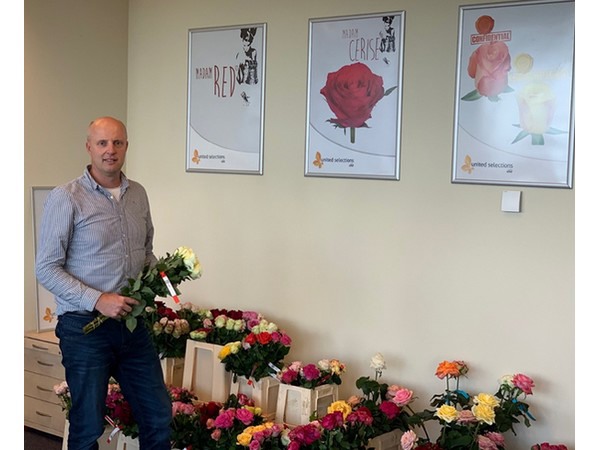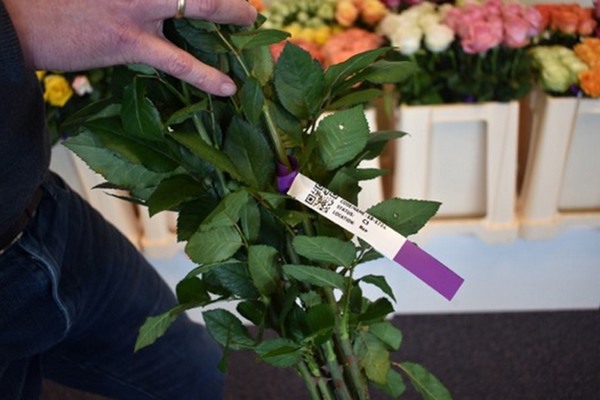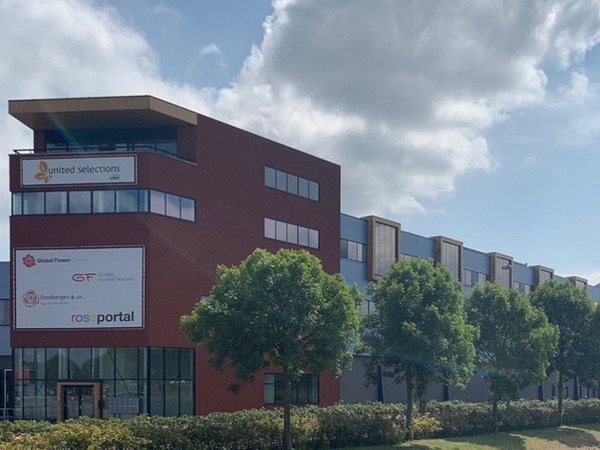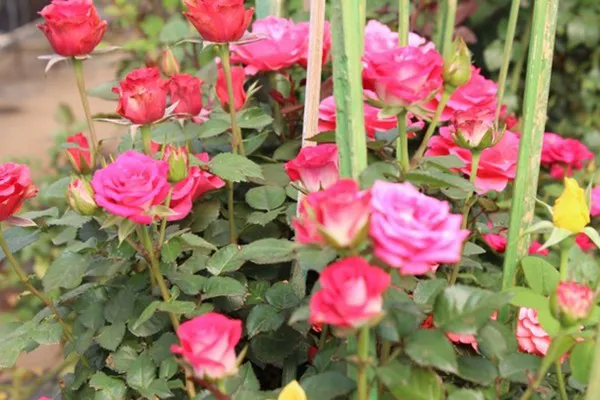As the flower industry reels from the effects of the COVID-19 pandemic, companies in the sector are finding ways to adapt to the situation. For United Selections, employees working remotely is normal already for quite some time. “Through the set up and way of working, they are able to work at distance and despite the current difficulties, they are able to get through this period. Having a lean, mean and efficient organization with a fully digitalized breeding system. This ensures, all data and information is collected and processed digitally.”
In fact, every day, rose breeder Paul de Bruin remotely checks his 'babies' digitally in the office in De Kwakel, the Netherlands. On his phone? Yes. For almost 10 years, United Selections has successfully been breeding their roses 100% in Kenya, and by having close contacts with colleagues on site and normally traveling to the breeding station in Nakuru, Kenya 8 to 10 times a year, De Bruin has been introducing new varieties on the market for years now. "We breed and select candidate varieties within the same climatic conditions as our clients. And it works."

Paul de Bruin in the office in De Kwakel, holding one of the codes that just arrived out of their breeding facility in Kenya.
When it all started
De Bruin has been working for this rose breeding company, United Selections for 20 years now. In 2011, the company was taken over, they changed course and decided to start product development in Nakuru Kenya, instead of in the Netherlands. This decision was made, while the process of relocation of Cut Rose cultivation to other climate zones was ongoing. The Dutch rose acreage decreasing from 1,100 ha to around 200 ha today and the acreage in Kenya and South America increasing. "This shift in production areas for Cut Roses, was the main reason, we decided to relocate our breeding and selection processes as well."
How to breed at bay?
So how does it work, breeding at bay? De Bruin explains: "Of course introducing the new discipline of Breeding Research at bay in Kenya brings lots of challenges, expected and unexpected. Responsibilities, instructions, and processes are regulated very strictly. Reliable intensive data collection is essential for Breeding Research. United Selections implemented the software system Ebrida and completely incorporated it throughout the company. We use an app, and by scanning QR codes, nothing is written or read - which in turn results in less chance of mistakes. "If I want to check how the varieties are performing, I will ask one of our staff members to check. They will go to the physical plants in the greenhouse, scan the QR label of each variety being tested, take a picture of the plant and answer the multiple choices that have been pre-set in the app by me. A simple synchronisation brings all the collected data in my database and directly available in all our other locations in the world", says De Bruin.
But a new rose can't be developed entirely digitally, De Bruin stresses. Therefore, 8-10 times a year, at flowering, De Bruin travels to the greenhouses in Nakuru (3 ha of breeding, selection and propagation) and Naivasha (selection and showhouse) to check processes, instruct people and observe and select candidate-varieties. In Nakuru, candidate varieties are selected not only for Kenyan rose growers, but for growers in all countries over the world, mainly Ecuador, Colombia, the Netherlands, but also China, Japan, South Korea, Ethiopia and Zimbabwe. Trial materials are sent from Nakuru around the world. "Most of the countries' conditions, Ecuador and Colombia for example, match Kenya, like altitude and latitude."

QR code on the flower test bunch
2020 Bi-annual Selection
In the month of June every year, United Selections conduct their annual selection meetings to define the new additions of newly bred varieties to the assortment of the following year. This is always taking place around the Nairobi IFTEX period. However, this year due to COVID-19 it has been different with selection taking place almost 100% digitally.
According to the company this was an exciting new process. The breeder managed to introduce 11 different standard roses into their assortment and an additional 6 spray roses.

Selected and promoted brand new roses.
Challenges and advantages
Of course, breeding at bay entails several challenges, but also advantages. "We are dealing with cultural differences and as we also propagate and produce starting materials for our clients and subsequently the whole flower chain, the hygiene protocols are very strict - which was quite new for the Kenyan flower industry. Due to close and frequent contacts, we can maintain all standards." “Of course, next to product development in the same conditions as the rose producers, a breeding station abroad is more cost efficient.
Another one is the location of the main office of United Selections in Holland. Being on the top floor of the highest building of the southern part of the Auction facilities in Aalsmeer, De Bruin oversees all processes. “We are next door to the auction, where flowers arrive from all over the world, where we can check the transportability of the roses and poll the opinions of the traders of our candidate and commercial varieties thus collecting invaluable feedback."

The office in De Kwakel.
It works
All in all, De Bruin is pleased with the decision to develop their products 100% in Kenya. "Regarding the varieties, we have become very strong especially in the red colored roses - and particularly regarding the productivity of cut rose varieties." Madam Red and Finally are the red varieties he is most proud of. "Madam Red is a red variety for the African market and Finally for the South American market - they both stand out in productivity." But also Jumilia makes his heart race. "It is one of our latest introductions for the Dutch market specifically. Even though it is a relative young variety, the final product is already being sold all over the world."
Breeding is De Bruin's passion. "A flower is emotion, a beautiful colored, opening rose can touch me every time, even though more than 100,000 genetically different flowers passes my view, one by one, every year. It is such a joy and a proud feeling to find a variety you've worked on for so long, back on the shelves in the supermarket or florist."

Future in breeding
When asking De Bruin about the future in breeding post COVID-19 and beyond, he foresees a trend towards shared value including 3 important developments: the increased use of modern DNA-techniques, cooperation between breeders, and more environmentally friendly varieties. "In the ornamental industry, I believe we will start working more on a molecular level and using DNA techniques, which is common in the vegetable and food industry. In this way, one can breed more specifically on characteristics of a product. However, in order to achieve this - as breeding of this type is quite expensive - new developed varieties should be awarded financially by producers. Also cooperation between the breeders is needed. And by breeding on the characteristics, new varieties and more disease tolerant varieties will arise: the environmental story."
However, De Bruin does not see a complete shift towards molecular breeding. "Molecular Breeding will become a tool, and as such, an important one, but classical breeding and selection will remain a kind of craftwork with passion and emotion. “A gene for emotion is yet to be found”, concludes, De Bruin
For more information:
Uni ted Selections
ted Selections
Email: [email protected]
www.united-selections.com
